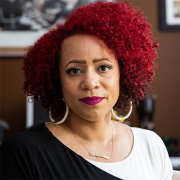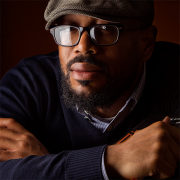Nikole Hannah-Jones covers racial injustice for The New York Times Magazine, and has spent years chronicling the way official policy has created—and maintains—racial segregation in housing and schools. Her deeply personal reports on the black experience in America offer a compelling case for greater equity. Hannah-Jones is the creator and lead writer of the New York Times' major multimedia initiative, “The 1619 Project.” Named for the year the first enslaved Africans arrived in America, the project features an ongoing series of essays and art on the relationship between slavery and everything from social infrastructure and segregation, to music and sugar—all by Black American authors, activists, journalists and more. Hannah-Jones wrote the project’s introductory essay, which ran under the powerful headline ‘Our Democracy’s Founding Ideals Were False When They Were Written. Black Americans Have Fought to Make Them True.’ The essay earned her her first Pulitzer Prize for commentary.
Hannah-Jones has written extensively on the history of racism, school resegregation, and the disarray of hundreds of desegregation orders, as well as the decades-long failure of the federal government to enforce the landmark 1968 Fair Housing Act. In 2016, she was awarded a Peabody Award and George Polk Award for radio reporting for her This American Life story, “The Problem We All Live With.” She was named Journalist of the Year by the National Association of Black Journalists, and was also named to 2019’s The Root 100 as well as Essence's Woke 100.
Hannah-Jones co-founded the Ida B. Wells Society for Investigative Reporting with the goal of increasing the number of reporters and editors of color. She holds a Master of Arts in Mass Communication from the University of North Carolina and earned her BA in History and African-American studies from the University of Notre Dame.
Khary Oronde Polk is an Associate Professor of Black Studies & Sexuality, Women's and Gender Studies at Amherst College. He is a cultural historian of the African American diaspora, a specialist in LGBTQ studies, and a scholar of race, gender, and sexuality in the U.S. military. Polk received his Ph.D. in American Studies from New York University, and teaches courses on black sexuality, military history, Black European studies, and queer theory. His book, "Contagions of Empire: Scientific Racism, Sexuality, and Black Military Workers Abroad, 1898-1948" (University of North Carolina Press, June 2020) examines how the movement of African American soldiers and nurses around the world in the early-to-mid twentieth century challenged U.S. military ideals of race, nation, and honor.
Polk has written for the Studio Museum of Harlem, "The Journal of Negro History," "Women’s Studies Quarterly," Gawker, and the journal "Biography: An Interdisciplinary Quarterly." He has also contributed essays to a number of queer of color anthologies, including "If We Have To Take Tomorrow," "Corpus," and "Think Again." Polk is a member of the African Atlantic Research Group, and recently held a visiting professorship at the JFK Institute for North American Studies at the Freie Universität Berlin.

